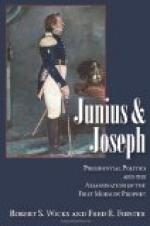“You are safe!” she cried. “Oh, my dear, I will never leave you again while danger is near—never, never again!”
In the evening of that day further news came from Hiram. The prophet had preached long and gloriously in the open air. New converts had been made, and he himself, scarified and bruised as he was, had gone down into the icy river and baptized them in sight of all. The mob had shrieked and jeered, but had been withheld by God, as the messenger said, from further violence.
Susannah made no further effort to find new life in the old doctrines. All her sentiments of justice and mercy combined to make her espouse her husband’s cause with renewed ardour.
CHAPTER V.
In the summer of that same year, while the wheat in the Manchester fields was still green, and the maize had attained but half its growth, while the ox-eyed daisies still stood a happy crowd in the unmown meadows, and pink and yellow orchids blazed in unfrequented dells, the preacher Finney, after long absence, chanced to be again travelling on the Palmyra road. As was his habit, he sought entertainment at the house of Deacon Croom in New Manchester.
The preacher remembered always that his citizenship was in heaven. From the thought he drew great nourishment of peace and hope, but as far as his earthly affairs were concerned the outlook was at present grievous.
He was returning from a long and dreary religious convention held in an eastern town, where one, Mr. Lyman Beecher, had stirred up against him the foremost divines of New York and Boston. They had asserted that Finney’s doctrine, that the Spirit of God could suddenly turn men from following evil to pursuing good, was false and pernicious; that his method stirred up the people to unholy excitements which were productive of great evil. Now the accusations of these divines (who, thinking that a man’s change of mind must needs be so slow a thing, some of them, gray-haired, had not as yet produced this change in a single sinner) were in many points wholly false, in many exaggerated, and where the article of truth remained in the accusation there was much to be said in defence of work that had resulted, if in some evil, certainly in much palpable good. To such groups of priests and soldiers and publicans as came forth to John’s baptism of repentance, the godly Finney, travelling now east and now west, had appealed, and that the wide land was the better for the crying of his voice no candid person who knew the result of his labours could deny. He that had two coats had imparted to him that had none; the extortioner had returned his unfair gains, and some rough men had become gentle. But in the assembly from which Finney had just come the larger numbers and the greater power of rhetoric had been on that side which appeared to show least faith in God and least zeal for men, and Finney had come out from the combat bruised in spirit.




